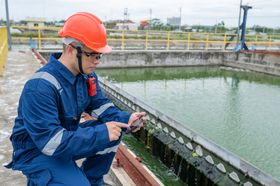How Much Water Should Triathletes Drink for Optimum Performance?
Published October 6, 2024

As a triathlon is a demanding event that involves swimming, running, and cycling in a competitive environment, completing one requires a wide range of physical and mental skills. As it demands strength, speed, flexibility, endurance, focus, and mental tenacity, the athlete needs to be in top shape—and one of the major contributors to a healthy body is proper hydration.
Water helps the body not only maintain temperature, remove waste, and lubricate the joints, but also reach peak performance levels during exercise. Not drinking enough will quickly lead to dehydration, which can cause serious problems like muscle fatigue, excess sweating due to increased body temperature, overheating, dizziness, and fainting. In this article, we'll cover how much water an athlete needs to drink to achieve optimal performance before and during a triathlon.
Staying Hydrated During Triathlon Training
Athletes need a lot more fluid than the average person.
- Prior to training Have between 200ml and 400ml of water immediately before you begin training.
- During training In cool conditions or when you're only sweating lightly, up to 500ml of water should be sufficient for most people. In warmer conditions or when sweating more heavily, up to 750ml might be necessary, while in very hot or humid conditions or when you’ll be sweating a lot, you may require as much as 1l per hour of activity.
- After training Aim to replace 150% of water loss over the following 2 to 4 hours post-exercise to properly rehydrate. So, if you lose 1l of sweat, you theoretically need to drink 1.5l of water for effective rehydration.
Keep in mind that caffeinated beverages have a dehydrating effect, so a good rule is to drink twice as much water as you did in the caffeinated beverage to make up for any fluid loss.
Hydration and Sodium
When your physical activity lasts longer than 2 hours, adding sodium to your water through mineral drops becomes more important. Before a triathlon, consuming water with at least 150mg of sodium per 700ml of liquid is advisable, while around 200mg of sodium in your water after the triathlon should be enough to restore your levels. Mineral drops contain sodium and other electrolytes essential for hydrating the body, supporting endurance and recovery, and assisting with optimal muscle function.
» Are you getting enough minerals? Buy our mineral drops now.
How Water Is Lost
Sweat loss is proportionate to your metabolic rate, and can amount to 3 or 4l per hour or as much as 10l per day. When partaking in physical activity, especially in the heat, the amount of water lost increases by 10 to 20%, or between 200ml and 300ml more per hour. It's crucial to replenish this loss by 1.5 times because proper hydration is necessary for optimum physical and mental performance.
Because water makes up around 70% of the human body, it's the best hydration option over tea, coffee, energy drinks, fruit, and other foods. One of the easiest ways to stay hydrated is by choosing a water bottle and carrying it with you throughout the day.
» Keep your kids healthy: Learn how much water they should drink.
Benefits of Drinking Spring Water
Spring water originates from an underground aquifer and is collected as it flows naturally to the earth’s surface. It contains natural minerals like calcium, sodium, potassium, and magnesium, which are essential for hydration and physical performance. However, access to pure spring water while on the go can be difficult. Fortunately, you can make your own version of spring water to carry in your water bottle. A water-enhancing carafe reoxygenates, rebalances, and rejuvenates water so it has all the beneficial properties of natural spring water and hydrates the body the way nature intended.
»Is bottled spring water better than filtered tap water? Find out here.
Be Careful Not to Over-Hydrate
Although proper hydration is essential for achieving optimal performance, it's also important not to over-hydrate. One of the easiest ways to monitor your hydration status is to check the color of your urine—pale yellow urine is optimum, so if it’s clear, you're over-hydrating. Symptoms of over-hydration also include cloudy thinking, nausea, vomiting, muscle weakness, spasms or cramps, and headaches.
In Summary
To achieve optimal performance, a triathlete needs to stay properly hydrated before, during, and after physical activity. Apart from hydrating with water, sodium is also very beneficial for good performance, hydration, and recovery. For the body to maintain an optimal state, drinking the purest water with all its minerals intact is the best option. If you're an athlete looking to achieve optimum performance during a future triathlon, you can make your own spring water at home to ensure you're consuming all the minerals your body needs to give it that extra boost.





































![3 Best Water for Athletes: Fuel Your Performance [{year}]](https://entail.mayuwater.com/en-assets/mayuwater/fit-in/280x280/shutterstock_2364200823-1695372721925.jpg)






